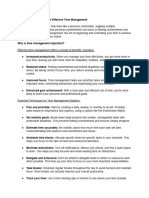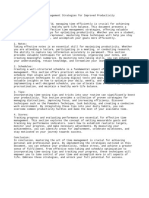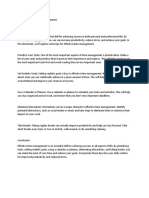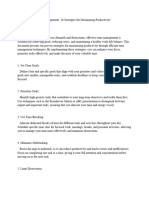0% found this document useful (0 votes)
115 views1 pageMastering Time - Strategies For Effective Time Management
The document discusses strategies for effective time management. It provides tips such as setting clear goals, prioritizing tasks, creating a schedule, avoiding multitasking, using time blocks, taking breaks, eliminating time wasters, learning to delegate, staying organized, and regularly reviewing and adjusting time management strategies.
Uploaded by
ahmedsyan3Copyright
© © All Rights Reserved
We take content rights seriously. If you suspect this is your content, claim it here.
Available Formats
Download as PDF, TXT or read online on Scribd
0% found this document useful (0 votes)
115 views1 pageMastering Time - Strategies For Effective Time Management
The document discusses strategies for effective time management. It provides tips such as setting clear goals, prioritizing tasks, creating a schedule, avoiding multitasking, using time blocks, taking breaks, eliminating time wasters, learning to delegate, staying organized, and regularly reviewing and adjusting time management strategies.
Uploaded by
ahmedsyan3Copyright
© © All Rights Reserved
We take content rights seriously. If you suspect this is your content, claim it here.
Available Formats
Download as PDF, TXT or read online on Scribd
/ 1

























































